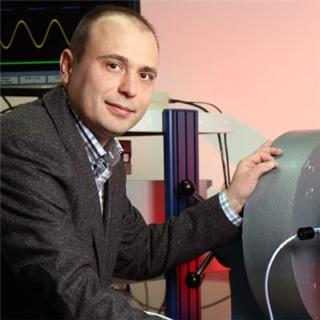Nov 30 2015
33-year-old physicist at the University of Kaiserslautern receives 1.5 million euros of EU funding.
 Dr. Andrii Chumak. Foto: Thomas Koziel.
Dr. Andrii Chumak. Foto: Thomas Koziel.
Young scientist Dr Andrii Chumak conducts research about the fundamental physics of next-generation data processing. His approach is based on magnons, also called magnetic spin waves, that hold the potential for significant improvements in the speed and performance of computers. At the University of Kaiserslautern’s State Research Center OPTIMAS, Chumak investigates how spin waves can be excited and manipulated in circuits smaller than one ten-thousandth of a millimetre. For this, he is now to receive a particularly prestigious package of financial support amounting to 1.5 million euros. The funding, which he will invest in his research over a period of five years, is being awarded by the European Research Council (ERC). Only a number of approx. 330 of these so-called “Starting Grants” are awarded across the whole of Europe – and across all scientific disciplines.
“For us at the University of Kaiserslautern, we consider this funding a great achievement. Considering his young age, Dr Chumak is one of our most outstanding researchers. We are immensely proud to be able to support him in his work,” says University President Professor Helmut J. Schmidt commenting on the successful funding acquisition.
Efforts to make electronic circuits ever smaller and faster are hampered by physical boundaries. For example, it becomes increasingly difficult to dissipate the heat generated by computing from the tiny structures. This is where Dr Chumak’s research comes into play. The physicist has suggested using a special type of spin waves that take up extremely little space and do quickly propagate. So far, these so-called exchange spin waves have only been scarcely studied. Therefore, Chumak and his team plan to investigate close to practical conditions how magnons of this kind can be produced and manipulated in solids, and how they interact with each other. “We want to develop a toolbox for producing magnonic conductors with a size of less than 100 nanometres,” says the Ukrainian researcher, who has been living in Kaiserslautern for seven years. “To do this, however, you first have to better understand the underlying physical phenomena, which are often quite exotic on such tiny scales.” The ultimate aim is to develop practical nano-circuits combining two important elements of magnonic data processing, namely magnonic transistors and majority gates. Both of these concepts have already been described for a different type of spin waves. Now, Dr Andrii Chumak hopes to show that these too can be miniaturised.
Waves instead of friction
The reason why computer chips heat up is that the electrons flowing through the material create a sort of friction. Magnonics offers a very promising opportunity to overcome this and other problems for higher-performance hardware. Instead of electrons, it is possible to make use of magnetic phenomena caused by the spin (the electrons’ intrinsic angular momentum). These immaterial waves of spins are referred to as magnons. “Waves can transport more information than particles,” says Andrii Chumak. “This opens up completely new possibilities for making computers even faster and more powerful.” However, magnonic components must also be very, very tiny if they are to stand any chance of competing with the semiconductor technology that is commonplace today. Current experimental designs are still occupying the millimetre scale – far too big to be installed in competitive chips.
Andrii Chumak’s career
The 33-year-old physicist had already started working on magnetic spin waves during his doctoral thesis at the University of Kiev. This work, carried out under the supervision of Professor Gennadii A. Melkov, was initially limited to fundamental research. In 2008, Chumak came to the University of Kaiserslautern, where he became a group leader in Professor Burkard Hillebrands’ team. In his current experiments, Chumak has increasingly turned his attention to application-oriented fundamental research. As a science-fiction fan, he is constantly amazed at how real-life technological development is overtaking any imagination: “Although all kinds of things have been predicted, such as the Mars landing, nuclear batteries or antigravity, I’ve never met anyone who guessed that, today, we’d have smartphones providing access to the world’s entire knowledge in our trouser pockets, as well as allowing us to make phone calls, watch TV, navigate and perform calculations.”
The year 2015 is an eventful one for Andrii Chumak: he not only is happy about the ERC funding, but even more so about the birth of his second daughter, Emma. Since 2013, he has been working on his habilitation thesis, which he hopes to complete in the coming year. After that, he plans to work as a professor at a German university. He has come to appreciate the advantages of this country, which he calls a “smart country” because of the support it provides to fundamental research as an investment in the future.